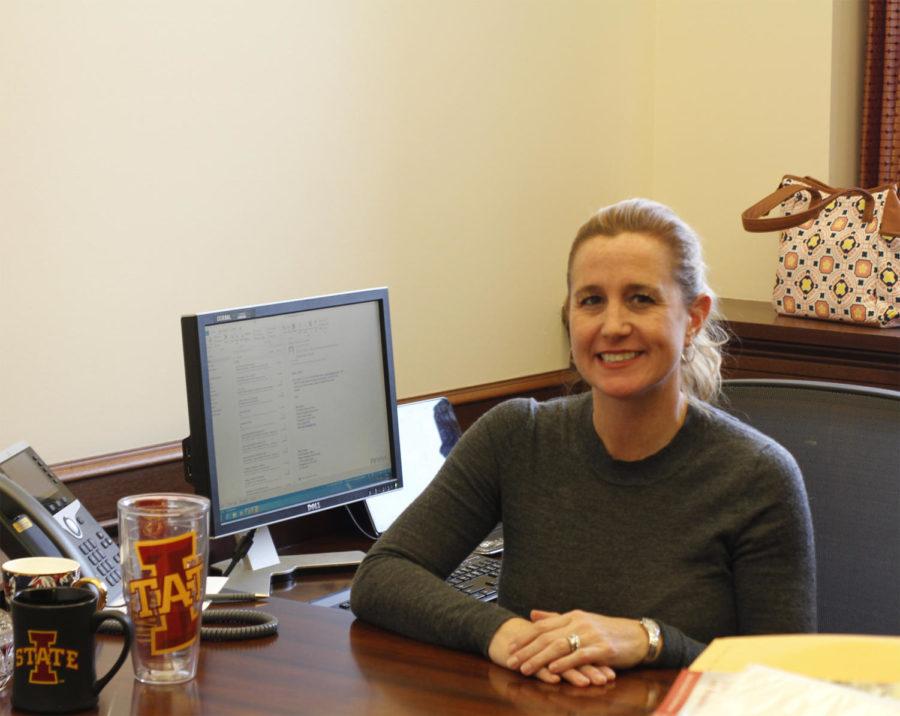Student input reigns supreme to Board of Regents state relations officer
Alexandra Kelly/Iowa State Daily
Kristin Failor was recently named State Relations Officer at Iowa State University. Before accepting her new position at ISU, Failor served as the director of government relations for the Iowa Telecommunications Association, assistant general for West Bank, and a research analyst for the Iowa Legislature.
January 23, 2017
Though her title is Board of Regents state relations officer, Kristin Failor, newly-appointed member in the office of the president, desires to be a pipeline for student input.
Failor is an Iowa native. Graduating from the University of Iowa in 1997, she later attended Drake University to study law. Failor first began eyeing the state relations officer position for the Board of Regents after speaking with former officer Joe Murphy. Murphy’s enthusiasm toward the position and Failor’s prior titles convinced her to give the opening a chance.
“I was a former staffer in the house and a lobbyist; this takes everything I loved about that job and removed what I hated,” Failor said. “Because in this role, you’re staffing the university, but you’re really a purveyor of information. Not twisting knobs like a lobbyist.”
Not conforming to a traditionally aggressive demeanor, as typically seen in many lobbyist roles, Failor describes herself as a goofy person — a trait she felt would be embraced at Iowa State.
Along with the difference in job description, Failor felt strongly about the atmosphere at Iowa State. Visiting schools in Colorado and Texas, Failor stands behind her belief that nothing can compare to Iowa State’s campus.
“There’s such a wonderful energy being on campus, Failor said. “It’s a salt to the earth Iowan type place. However, I still don’t understand how some of you can walk around in T-shirts and shorts in winter. That will always be odd.”
Failor described the students of Iowa State as “Midwest nice,” stating that a student helped her make her way across campus when she was lost and giving her the feeling that the population on campus “epitomizes Iowa.”
Emphasizing the importance of various voices on campus, Failor wants to help vocalize student input to not only the university but also directly to the Board of Regents.
“I met with the student body president and I told him that it’s been a while since I’ve been a student, so I don’t necessarily know everything that’s going on,” Failor said. ”But I do know how to operate things around here, so I can be of help to you, and that will be the same for the next president predecessor.”
By establishing a connection with the Iowa State Student Government, Failor encourages all students to voice their opinions to the governing board. That information will then be brought up through administration, where it can be handed off to the right desk.
“Having a connection with students also helps me do my job better,” Failor said. “I think President [Steven] Leath does a good job of keeping in touch with the student base, but I want to be a conduit for him to maintain that relationship. It’s what helps keep a campus healthy.”
Given the controversial nature of several of the changes coming to Iowa State in the near future, such as tuition increases, Failor foresees possibly having difficulties with relaying information to students. But she still sees many of the problems the campus faces as positives.
“There have been interesting issues brought up, such as voter ID law changes, and tuition changes, which are a huge deal for students and for their families as they consider Iowa State,” Failor said. ”It’s my understanding that we are getting bigger and bigger each year, but it’s still great because it’s a good problem to have. But you still have to get in front of it before things become too big.”
Failor referenced Iowa State’s large job placement rate, saying the balance between prospective students and active students is key.
“It’s always a juggling act,” Failor said, as every action of the university affects another, but she remains confident in Leath’s vision for the future.
Above all, she hopes students will begin to value their own voices because they are integral to the success of the entire university.
“The student’s opinion is so important and has immense power,” Failor said. “It takes courage to speak up, even more so to speak up and criticize, but the power comes from speaking up, offering a critique and then suggesting solutions. That’s how the students can be most effective.”







